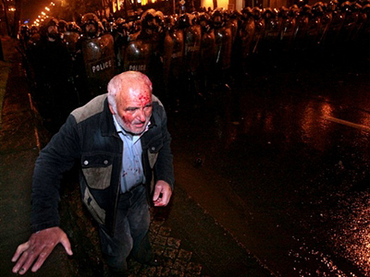
TBILISI, DFWatch–A court in Georgia on Friday questioned witnesses and participant in a demonstration on May 26 in 2011, which was violently dispersed by the police causing several deaths.
One of the participants, Gia Burjanadze from the People’s Assembly, recalled that when the special unit came to Rustaveli Avenue, where the rally was underway, he entered Rustaveli Cinema with two of his friends and got up to the roof of the building, considering that it would be safer there.
“What we saw was a disaster. People were lying on the ground with hands cuffed and special unit employees were beating them,” he said, adding that they tried to get down from the roof unnoticed, but were seen.
“Six people got me down. They put me in the bus, where there were beaten people, and took us to Gardabani. Then they brought us to Tbilisi police department.”
He said no one touched him at the department, but he was chained.
The anti-government rally was first held in front of the Public Broadcaster and later moved to outside parliament. May 26 is Georgia’s Independence Day, and a military parade was planned in front of the parliament building. The government argued that it was necessary to disperse the protesters to make way for the parade.
Burjanadze explained that they moved to Rustaveli Avenue because they didn’t want ex-President Mikheil Saakashvili to conduct the military parade.
“We wanted to mark Independence Day, the day of victory for Georgia, with a concert, people walking, some would come and remember the heroes of Georgia,” she said.
Nona Gaprindashvili, who also participated in the May 26 rally, said that Saakashvili didn’t have a moral right to conduct the military parade, because he was ‘crawling on the ground in Gori during the 2008 war.’
“I am proud that I was one of the leaders and was standing with those people,” she said, adding that the government’s actions were barbarian.
She recalled that they weren’t allowed to run, but were fenced in. No-one hit her and she was safe, but she experienced stress, and her son was beaten.
“In the evening of May 25, Burjanadze came to me and said that it was better if we would stop the rally, because there were less people,” she remembers. “But I said it would be better to spend the night together and wait for May 26 together.”
Gaprindashvili said that if they knew what would have happened, they would have dissolved the rally.
Kakha Kukava, leader of the Free Georgia Party, said that he was at the rally out of solidarity with its participants. He recalled being detained without explanation, but was later released. He had a few injuries, also in the head.
Vano Merabishvili, who was interior minister at the time and is charged in the case, asked the judge for permission to leave the courtoom.
After Friday’s hearing, his lawyer said that those who were questioned clearly indicated that the reason for moving the rally to Rustaveli Avenue was to interrupt the Independence Day parade and they didn’t leave the premises despite a warning from City Hall.
The hearing will continue on January 28.

